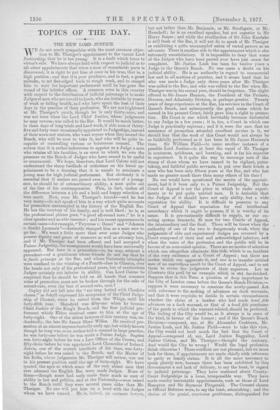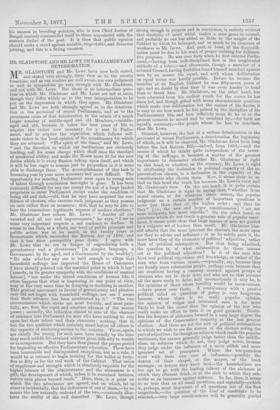TOPICS OF THE DAY.
THE NEW LORD JUSTICE.
WE do not much sympathise with the most common objec- tion to Mr. Thesiger's appointment to the vacant Lord Justiceship, that he is too young. It is a fault which leans to virtue's side. We have always held with respect to judicial as to all other appointments that when a man of remarkable parts is discovered, it is right to put him at once in his true, that is, a high position ; and that it is poor prudence, and in fact, a great mistake, to set fine-edged tools to rough work, and to compel him to wait for important preferment until he has gone the round of the inferior offices. A common error in this country with respect to the distribution of judicial patronage is to make Judges of men who are too old to learn, who are irritable by reason of weak or failing health, and who have spent the best of their days in the practice of their profession. We are not frightened at Mr. Thesiger's youth, though he is only thirty-nine, and was not born when the Lord Chief Justice, whose judgments he may reverse, was called to the Bar. It would be much better, in these days of long trials and hard work, if able men of thirty- five and forty were occasionally appointed to Judgeships, instead of their worn-out seniors, who want repose when they ascend the Bench, who will be sure to take it, and who will be quite in- capable of controlling verbose or boisterous counsel. The notion that it is rather indecorous to appoint as a Judge a man who retains all his faculties, is an error to whieh we owe the presence on the Bench of Judges who have ceased to be useful or ornamental. We hope, therefore, that Lord Cairns will not understand the sharp fusillade of criticisms on his latest ap- pointment to be a warning that it is unsafe to nominate a young man for high judicial preferment. But obviously it is essential that if seniors are passed over in favour of a young- ster, he should be of extraordinary ability, a man quite out of the line of his contemporaries. This, in fact, makes all the difference between a job and a bold and happy selection of true merit. Now, even Mr. Thesiger's friends—and he has very many—do not speak of him in a way which quite accounts for promotion unexampled in the history of the English Bar. He has the courtesy of his family, and is well liked ; he is, as the professional phrase goes, "a good all-round man ;" he is a clear speaker and an able reasoner ; and his recent appearances in certain cases—for example," Twycross v. Grant" and "Johnson v. Cre'dit Lyonnais "—distinctly stamped him as a man sure to go far. We want a little more than ever some Judges who possess dignity and grace of manners as well as attorney lore, and if Mr. Thesiger had been offered and had accepted a Puisne Judgeship, the arrangement would have been universally approved. But here is a promotion—in its way, without a precedent—of a gentleman whose friends do not say that he is facile prineeps at the Bar, and whose University triumphs were confined to the winning of a Fourth-class in Classics, over the heads not only of his professional peers, but of meritorious Judges certainly not inferior in ability. Can Lord Cairns be surprised that he should be told on all hands that common rules of promotion must not be broken through for the sake of second-rate, even the best of second-rate, men Copley did not fall into the rat-trap baited with Cheshire cheese," as Jekyll expressed his acceptance of the Chief Judge- ship of Chester, when he ratted from the Whigs, until his forty-fifth year. Mansfield was fifty-one when he became Chief Justice of the King's Bench, and the .first judicial pre- ferment which Eldon received came to him at the age of forty-eight. One of the ablest la wyers,of this century was, un- doubtedly, the late Sir James Shaw Willes. He received pro- motion at an almost unprecedentedly early age,but widely known though he long was, as an author and a counsel in large practice, he was forty-one before he was made a Pmsne Judge. Sugden was forty-eight before he was a Law Officer of the Crown, and fifty-three before he was appointed Lord Chancellor-of Ireland. Jervis, one of the acuteet intellects of his time, was forty- eight before he was raised to the Bench, and the Master of the Rolls, whose judgments Mr. Thesiger will review, was not in his present position until the age of forty-eight. We have quoted the ages at which some of the very ablest men that ever adorned the English Bar were made Judges. None of them—though some had early made their mark as men of ability in law and politics, and at the University—were raised to the Bench until they were several years older than Mr. Thesiger. No one will put him on a level with the Judges whom we have named. He is, indeed, an eminent lawyer,
but not better than Mr. Benjamin, or Mr. Southgate, or Mr.. Herschell ; he is an excellent speaker, but not superior to Sir Henry James ; and while the recollection of Sir John Kerslake is still fresh at the Bar, it will not do to speak of Mr. Thesiger as exhibiting a quite unexampled union of varied powers as an advocate. There is another side to the appointment which is also extremely unsatisfactory. It is impossible to deny that some of the Judges who have been passed over have just cause for complaint. Mr. Justice Lush has been for twelve years a Judge in the Queen's Bench. No one casts a doubt on his judicial ability. He is an authority in regard to commercial law and in all matters of practice, and it seems hard that he who was made a Judge only three years after Mr. Thesiger was called to the Bar, and who was called to the Bar when Mr. Thesiger was in his second year, should be forgotten. The slight offered to Sir James Hannen, the President of the Probate, Divorce, and Admiralty Division, is perhaps greater. Twenty years of large experience at the Bar, his services in the Court of Queen's Bench, and subsequently the good name which he earned in his present Court, fairly gave him a right to promo- tion. His Court is one which inevitably becomes distasteful to any Judge in a few years ; it is, too, a Court in which one Judge is practically supreme ; and if it were the case that no assurance of promotion attended excellent service in it, we should fear that the work of this Court would not always be so faithfully performed as it has been in Sir James Hannen's time. Sir William Field—to name another instance of a possible Lord Justice—is at least the equal of Mr. Thesiger in acuteness, quickness, and learning, and is far his superior in experience. Is it quite the way to encourge men of the stamp of those whom we have named to be 'vigilant, pains- taking, and faithful public servants, to put over their heads a man who has been only fifteen years at the Bar, and who has made no greater mark there than many others of his time ?
No one would have questioned the merits of the appoint- ment, had it it been only to a Puisne Judgeship. But the Court of Appeal is not the place in which to make experi- ments or to put quite untried men. It is desirable that the Judges of it should have not only ability, but a wide reputation for ability. It is difficult to preserve to any Court of Appeal that reputation for real intellectual ascendancy which it ought to possess, if it is worthy of its name. It is pre-eminently difficult to supply, as our ex- acting system demands, fit men for two Courts of Appear, the intermediary and the final. There will be times when the authority of one of the two is dangerously weak, when the judgments of able and experienced Judges are reversed by a Court composed of their real and acknowledged inferiors, and when the voice of the profession and the public will be in favour of an over-ruled opinion. There are no modes of selection which can altogether eliminate this risk, which is an incident of the very existence of a Court of Appeal ; but there are modes which can aggravate it, and one is to transfer untried men of no marvellous merit to the Court of Appeal, and to set them to revise the judgments of their superiors. Let us illustrate this peril by an example which is ribt far-fetched. Suppose that in this Term a question of deep importance ta the City of London came before the Queen's Bench Division,— suppose it were necessary to construe the newly-passed Act with reference to the making of advances on dock warrants, and that it were requisite to decide in certain circumstances whether the claim of a banker who had made bond fide advances on a dock warrant, or that of a bond fide purchaser of the goods to which the warrant related, should be preferred. The feeling of the City would be, as it always is in cases of the kind, in favour of the former ; and if the Queen's Bench Division—composed, say, of Sir Alexander Cockburn, Mr. Justice Lush, and Mr. Justice Field—were to take this view, the City would not heed much the fact that the Court of Appeal—composed of, say, Lord Justice Baggallay, Lord Justice Cotton, and Mr. Thesiger—thought the contrary. And would the City be wrong ? Would the legal profession think otherwise ? These conflicts are not pleasant, but we must look for them, if appointments are made chiefly with reference to party or family claims. It is all the more necessary to speak plainly now, because there has been exhibited by this Government a sad lack of delicacy, to say the least, in regard to judicial patronage. They have scattered about County- Court Judgeships in a loose, irresponsible way. They have made sundry inscrutable appointments, such as those of Lord Hampton and Sir Seymour Fitzgerald. The Counsel chosen as Official Referees were, to say the least, astonishing ; and the choice of the genial, courteous gentleman, distinguished for his success in breeding pointers, who is now Chief Justice of Bengal scarcely commended itself to those acquainted with the onerous duties of the post. It is time that public opinion should make a stand against amiable, respectable, and decorous jobbing, and this is a fitting occasion.



































 Previous page
Previous page